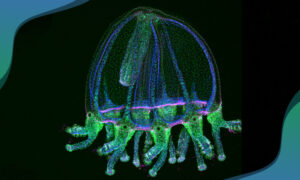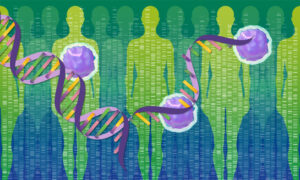
My microbes
Our gut bacteria’s collection of genomes is unique, and remains stable over time
In a nutshell :
- The gut metagenome is the collection of all the genomes of all the microbes in the human intestinal tract : it is specific to each human, like a second genetic signature
- At least in healthy humans, this personal metagenome is stable over time
- The gut metagenome is very large and complex: scientists developed innovative, state-of-the-art, computational tools to analyse it with a high resolution
We all have E.coli bacteria in our gut but each of us carries a version that is genetically slightly different. The same can be said of most gut microbes: our own gut metagenome, that is the sum of all the genomes of all our gut microbes, appears to be really specific to each of us, and to remain stable over time. For the first time, researchers from the European Molecular Biology Laboratory (EMBL) have studied this metagenome at such a high resolution that individual mutations in the various strains could be analysed. Their findings, published today in Nature, could have widespread consequences in medicine: gut microbes are known to be essential for functions as vital as digesting food or providing vitamins, but can also be involved in diseases if they carry certain mutations.
The scientists analysed the gut metagenome of 207 individuals from Europe and the USA, matching more than 7 billion pieces of DNA (of 100 lettres each) to the genomes of our most abundant gut microbial species. “This large scale analysis showed that, at least when healthy, we carry a unique set of bacterial strains and their mutations in our gut, over a long time,” explains Peer Bork who led the study at EMBL. “It is like a second genetic signature, but one that probably does not come from our parents but that we acquire from the environment in early childhood.”
When comparing the specific mutations from the same individual over time, the researchers found that the metagenome remains stable for at least one year, and probably much longer when the individuals are healthy. Results also show that there is only little geographic difference when comparing metagenomes of European with North-American individuals. This indicates that gradual adaptation is possible.
For each individual, approximately 6 billion DNA letters of their gut metagenome have been analysed, many more than the 3.3 billion DNA letters of human DNA that we inherit from each of our parents. These 6 billion DNA letters belong to hundreds of microbes, each with thousands of different strains or variants: mapping each DNA fragment of the metagenome to its right place, in the right bacterial genome, is extremely complex. To achieve this breakthrough and carry the analysis down to the single DNA letter, scientists had to develop various new computational methods. In the current study more than 10 million mutations have been detected in the 207 individuals.
All these detailed data is now stored in public databases, such as dbSNP, freely available to the scientific community. These findings could lead to the development of new approaches in the identification of gut diseases, pathogens, or antibiotic resistance. On the longer term, they may also open new avenues for personalised therapies.
Further information:
More information on the research projects of the Bork group
Previous research on the gut microbiome by Peer Bork
My Microbes project – discover your gut type
Article abstract
While large-scale efforts have rapidly advanced the understanding and practical impact of human genomic variation, the latter is largely unexplored in the human microbiome. We therefore developed a framework for metagenomic variation analysis and applied it to 252 fecal metagenomes of 207 individuals from Europe and North America. Using 7.4 billion reads aligned to 101 reference species, we detected 10.3 million single nucleotide polymorphisms (SNPs), 107,991 short indels, and 1,051 structural variants. The average ratio of non-synonymous to synonymous polymorphism rates of 0.11 was more variable between gut microbial species than across human hosts. Subjects sampled at varying time intervals exhibited individuality and temporal stability of SNP variation patterns, despite considerable composition changes of their gut microbiota. This implies that individual-specific strains are not easily replaced and that an individual might have a unique metagenomic genotype, which may be exploitable for personalized diet or drug intake.


